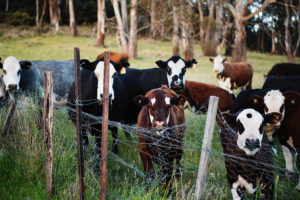Formation is a series of posts about ideas and truths God is using to shape us at Pulpit Rock.
I once heard a story about an Australian cattle farmer who was raising cattle in the dry climate of the Australian outback. A visitor to his farm noticed that the farmer had not built a single fence on his farm. He asked the farmer “how do you keep your cows from wandering off?” The farmer simply pointed to the well that was in the middle of his property.
“That,” he said, “is the only accessible source of water for miles. The cows know it. So they stick around.”
There are two approaches to the spiritual life that have remarkably different outcomes: fence building and well digging.
Fence Building
 Fence building spirituality is something we call “Boundary Focused Faith” – it refers to the tendency that we all have to draw lines. Our tendency is to build fences to separate who is in the herd and who is out. Fence building helps us identify who is one of “us” and who is one of “them.”
Fence building spirituality is something we call “Boundary Focused Faith” – it refers to the tendency that we all have to draw lines. Our tendency is to build fences to separate who is in the herd and who is out. Fence building helps us identify who is one of “us” and who is one of “them.”
If we are the cattle in this analogy, the fence would be all the things that we think makes someone a Christian. The beliefs and positions that they hold. The behaviors and practices that they do. And the people with whom they hang out.
Boundary focused faith has a high value on identifying who is a Christian and who is not. Boundary focused faith tends to make a lot of sense to our hearts. It gives us certainty on what we are and what we are NOT.
As I see it there are two problems with this approach. The first is when we divide the world into us and them it always undermines our ability to truly love. We naturally tend to love those who are “us” more deeply. And we naturally tend to develop some suspicion and even animosity towards “them.”
But the biggest problem with boundary focused spirituality is: Jesus didn’t live this way.
When we read the gospels with this lens we see that Jesus constantly crossed boundaries. He regularly found faith in people who believed the wrong thing, behaved the wrong ways and hung out with all the wrong people.
While we DO find some possible examples of boundary focused spirituality in Acts and the Epistles – it all comes from the genuine efforts of the early church to understand what it means to follow Jesus as his disciple in a world that was growing more hostile. The world was changed by those early believers not because the built fences to determine who is in or out, but because the stayed focused on the well – Jesus, the living water. It was the way the early church radically followed Jesus that turned the world upside down. And while they wrestled with fence questions (like what do you have to do to be saved, meat sacrificed to idols, circumcision, following the Old Testament law), the overwhelming focus was following Jesus not clarifying the boundaries.
I’m not here to suggest that boundary focused faith is worthless. I’m here to suggest that we have been called to something bigger. Boundary focus is a part of the human condition. God knows that and has grace for that. But he also calls us to something better. He calls us to “Jesus Centered Faith.”
Well Digging
 Jesus centered faith is more like “well-digging spirituality.” This refers to the tendency Jesus had to draw people to himself whether the were a part of the herd or not. In this analogy, Jesus is the well that draws us the cattle to himself because in him we find life (water).
Jesus centered faith is more like “well-digging spirituality.” This refers to the tendency Jesus had to draw people to himself whether the were a part of the herd or not. In this analogy, Jesus is the well that draws us the cattle to himself because in him we find life (water).
When Jesus called his disciples he said “follow me” he didn’t say “convert to my religion.” When Jesus encountered people outside the herd like – the Gadarene Demoniac, the Roman Centurion, The woman at the well, Zacchaeus, the woman caught in adultery, Matthew, Pilate, the Syrophoenician woman etc. – He offered them himself. He was gentle with their wrong beliefs and their wrong behaviors, and he made himself a friend to them.
Jesus knew that “joining the herd” would not save them or help them. So instead of building a fence and asking them to stay within it, He introduced them to “a spring of water welling up to eternal life.” And he trusted that once they tasted that water – they would keep coming back to it and the rest would work out.
These may sound like subtle shifts. But I’ve seen in my own life how often I struggle to do both. I wind up choosing … am I going to focus on fences or wells? Am I going to focus on being a Christian, or following Jesus?
I’ve found that when I get focused on being a good Christian I become very comfortable. I was raised in Christianity, it’s fairly easy to stay within the boundary. But when I focus on following Jesus – suddenly I’m stretched and challenged. I have to be honest about things I’d rather ignore. I have to be present with people I’d rather not be friends with. I have to leave the neat and tidy box that brings me comfort – because there is no water for my soul there. And suddenly/always I realize when I follow Jesus that “being a good Christian” pales in comparison to the life-giving adventure of following Jesus.
We will never escape our tendency to draw boundaries. But by God’s grace, I see that he woos us away from that way of thinking. It’s been helpful to me to identify the difference between these two approaches, so that I can gravitate towards the better thing. Here are a few differences I see – I’d love to hear what you would add to these lists.
Boundary Focused Faith
A. Focus on who is “in” and who is “out” – there is a lot of attention paid to the markers of the true believers
B. Energy given to drawing lines and clarifying differences
C. Labels are powerful and used to motivate behavior
D. Expectations and accountability are intended to keep people from wandering from the faith
E. Our focus is on being right and holding accurate opinions.
F. Our fear and anger towards those outside the faith grows
G. People must believe rightly and behave rightly to be welcomed in
H. High value on agreement
I. There is an obsession with right and wrong
J. The goal is to make converts to the religion
K. Fear of being left out
Jesus Centered Faith
A. Focus on who is following and who is not – there is a lot of attention paid to becoming more like Jesus
Matthew 3:18-22
B. Energy is given to building bridges across lines and boundaries
Matthew 8:5-13 (especially pay attention to verse 10)
C. Identity is powerful and motivates heart change
John 10 27-30
D. Jesus’ kindness and love draws people to turn to him (repent) from the inside out
Luke 19:1-10 – Zacchaeus
John 4:1-45 – The Samaritan Woman (pay attention to what Jesus does not say)
E. Our focus is on being redemptive and partnering with God to make things new.
Revelation 21:3-6
F. Our compassion and empathy towards those who are thirsty for love grows.
Matthew 9:35-39 (especially pay attention to verse 36)
G. People must belong and be welcomed before their beliefs and behavior change.
John 8:1-11 (notice what Jesus says first to her)
H. High tolerance for messiness
Luke 7:36-50
I. There is an obsession with God’s kingdom. (That is: the loving reign of God on earth through Jesus Christ who is restoring all things)
Matthew 4:17, Mark 4:26-32, Luke 17:20-21, John 18:33-38
J. The goal is to introduce people to Jesus.
John 4:28-30 (especially verse 29)
K. Confidence in God’s love
Romans 8:31-39
Here are a few other passages that point us toward Jesus centered faith and away from boundary focused faith:
John 6:22-40 (especially verse 35), John 12:27-36 (especially verse 32), John 21:20-22, John 7:37-39, Acts 4:5-12, Romans 7:21-8:4, Galatians 3:1-6, Ephesians 2:1-10, Colossians 1:15-20, Hebrews 1:1-4, 1 Peter 1:3-9
I don’t know if there is a theological shift that is more important for our day and age than for us to become Jesus centered instead of boundary focused. The boundaries and fences in our world are higher than ever. If ever there was a moment that needed people who cross boundaries and dig wells it is now.
We will wrestle with it of course! Boundaries are in our nature. But when we continue to return to Jesus “the pioneer and perfecter of our faith” we will find that the water he offers is better. Boundary focused faith is not all bad. But it does not compare to the adventure of following the living water.
May you drink deeply and return often to the well. And may you teach others to do the same.




Well said Jonathan, may it be so!
Beautiful work with this imagery, I use it as well in my new book. I thought you would be interested in it: Centered-Set Church: Discipleship and Community Without Judgmentalism, IVP. After descriptions of bounded, fuzzy, and centered-set churches, rooted in narratives, the majority of the book focuses on application—how to live out a centered approach. It overflows with examples I gleaned from interviews I did with church leaders and focus groups. I hope that if you find it helpful you will help me spread the word about the book and join me in praying that more people will be liberated from bounded group religiosity and transformed through discipleship centered on Jesus.
Please check it out: https://www.centeredsetchurch.com/
I also have made a five-part video series for use with groups, Introducing Centered-Set Church: Video Series & Discussion Guide. You can watch the two-minute trailer at the website..
Grace and peace,
Mark